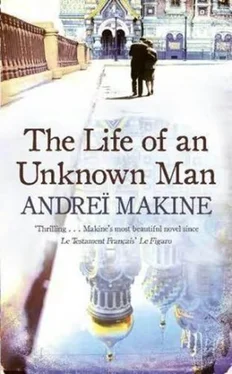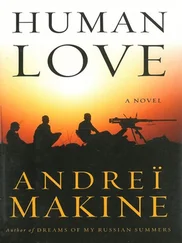Andreï Makine - The Life of an Unknown Man
Здесь есть возможность читать онлайн «Andreï Makine - The Life of an Unknown Man» весь текст электронной книги совершенно бесплатно (целиком полную версию без сокращений). В некоторых случаях можно слушать аудио, скачать через торрент в формате fb2 и присутствует краткое содержание. Жанр: Современная проза, на английском языке. Описание произведения, (предисловие) а так же отзывы посетителей доступны на портале библиотеки ЛибКат.
- Название:The Life of an Unknown Man
- Автор:
- Жанр:
- Год:неизвестен
- ISBN:нет данных
- Рейтинг книги:3 / 5. Голосов: 1
-
Избранное:Добавить в избранное
- Отзывы:
-
Ваша оценка:
- 60
- 1
- 2
- 3
- 4
- 5
The Life of an Unknown Man: краткое содержание, описание и аннотация
Предлагаем к чтению аннотацию, описание, краткое содержание или предисловие (зависит от того, что написал сам автор книги «The Life of an Unknown Man»). Если вы не нашли необходимую информацию о книге — напишите в комментариях, мы постараемся отыскать её.
The Life of an Unknown Man — читать онлайн бесплатно полную книгу (весь текст) целиком
Ниже представлен текст книги, разбитый по страницам. Система сохранения места последней прочитанной страницы, позволяет с удобством читать онлайн бесплатно книгу «The Life of an Unknown Man», без необходимости каждый раз заново искать на чём Вы остановились. Поставьте закладку, и сможете в любой момент перейти на страницу, на которой закончили чтение.
Интервал:
Закладка:
“My father was saved by dying.”
Mila murmured this, echoing Volsky’s words and at once, seeing his puzzled look, hastened to explain.
“He was an officer in Mongolia in 1939. He took part in the Battle of Khalkhyn Gol. One day, when he was talking to a man he thought was his best friend, he ventured on a piece of black humor: ‘If you ask me, there are more army officers in the camps than we have here in our ranks.’ Some throwaway remark like that. The commanding officer summoned him and told him to prepare himself for the worst. The next day during the assault on the Japanese he was the first to be shot down. The truth is he got himself killed. One of his comrades told us about his death. The people who were supposed to arrest him came back empty-handed: instead of apprehending an enemy of the people, they were confronted with an officer fallen on the field of battle, almost a hero. After that they left my mother and me alone as well.”
It had all been said. The two stories, they knew, summed up the country in which they lived. Its fears, its wars, the defenseless nakedness of private existence, the impossibility of sharing one’s distress. The extreme difficulty of having faith in human goodness and at the same time the awareness that only this faith could still save. A country where millions of people woke in the night, listening to the hiss of tires on the asphalt: Is that car going past? Or is it stopping outside?
“You’ve never talked to me about your father…,” said Volsky, as if in reproachful tones.
“We never had time… Besides, if we’d started thinking about all that, we’d not have had the will to go on living.”
Volsky’s first impulse was to object, to invoke the need to bring the truth out into the open. But he thought better of it, sensing in Mila’s words a truth at once more humble and almost arrogant in its frankness. She smiled. “We wouldn’t even have been able to act at the theater. Remember: ‘To you, my beloved, I shall confide my dream…’ It was partly those songs that helped us to survive. And so many people with us!”
Thirty years later Volsky would reflect that this, too, had been his country: a couple who had been through hell, whose lives were now caught in the lens of a pair of binoculars, as if in a marksman’s sights, yes, this pair of lovers seated on the front steps of an izba, in the pale light of an August evening, gazing at a ridge punctuated with graves above a riverbank, softly singing light melodies from an ancient, old-fashioned operetta.
They often talked now about those performances given during the blockade, the audience shivering in the darkness, Porthos singing, his face bathed in tears, actors collapsing onstage, exhausted by cold and hunger. Those wartime days became their strength, their courage, and when they pictured that last concert under gunfire, all fears seemed to them ludicrous: those two agents from Security come to spy on them? A single minute of that concert was far more daunting than any other threat.
Thinking about the children they were going to house also helped them not to live in the humiliation of fear. Constructing a bed, cutting a shirt out of an old sheet, the routine nature of such actions linked them to a future in which young lives would take possession of these objects, use them, bring them to life. And when they recalled from what depths of unhappiness these children would be coming to them, those two agents with their binoculars just seemed like ham actors.
One evening they set up a big screen that was to divide the dormitory in two. Handling the slippery fabrics reminded them of the curtain going up and the idea arose, like a spark, in their exchanged glances: they should teach the children to act in a play, yes, to make theater-and sing in an operetta, why not?
To the very end they resisted fear. And when, on one occasion, Volsky happened upon a cigarette stub with a gilded ring among the graves in the cemetery, he trampled this menacing token with scorn and gave a laugh: “The Germans used to smoke elegant cigs like that, too.”
So they did not live through the sleepless nights that so many people underwent, on the alert for the hiss of tires outside the entrance to their building. The danger they braved erupted in broad daylight, in a huge uproar of curses, gesticulating hands, absurdly angry faces. A far cry from the silent, sly terror slowly seeping into everyone’s spirits.
On this September day Mila went into Leningrad to hand in a notebook at the Blockade Museum: it had been found on a sandy slope by the shore, notes in German. When she made her way into the courtyard of the building she thought at first it must be a fire, then an anarchic demolition site, then a brawl taking place amid a conflagration. It was all these things at once. A bonfire was blazing in front of the entrance to the warehouse that served as the exhibition hall. Military personnel (those “army officers” from State Security) were actively thrusting back the employees of the museum who seemed to be trying to leap into the flames. There was little shouting and this absence of words made the scene all the more distressing. But these women were not trying to immolate themselves, their hands were reaching into the fire to extract objects in order to save them. And the agents of State Security were hurling humble items into the blaze that they had just snatched from the exhibition hall: bundles of letters, clothes, photographs… The struggle was fierce. Elderly women were battling against a wall of fists and rifle butts, falling, picking themselves up, rushing toward the fire.
… It was not the bloodiest day in the history of the regime holding sway in that country. It was its day of greatest shame. And when, decades later, they opened the archives on the killings and repressions, they did not always dare to mention this deadly bonfire…
Mila was not aware how she found herself in the middle of the battle. She felt the scorching of the flames on her hands, her lips were bleeding, one sleeve of her dress dangled, half torn off. The heavy pounding of male fists thrust her back, she crouched, forced a way out for herself, seized a book, a photograph, tried to protect them, to hide them. An unfamiliar joy was mingled with the frenzy of this salvage operation: no protest had ever arisen in the country against the monolith of these dark uniforms and here the very first rebellion saw these women rising up, their bodies emaciated by the years of war, survivors with the angular faces of starved women.
Hysterical shouting suddenly broke out at the exhibition hall’s exit. A plump man of small stature appeared, surrounded by his entourage. Mila quickly recognized him from official portraits in the newspapers: Malenkov, a member of the Leader’s praetorian guard. The uniforms stood to attention, breaking off the massacre.
“Aha! The factionalists in hiding!” he bellowed. “They’ve spun themselves a web of rampant reaction here! They’ve fabricated the myth of a Leningrad fighting all alone, without the leadership of the Party! They’ve left out the vital role of the great Stalin, father of our victory! Everyone out! All this stale rubbish to the fire! Quickly! Move!”
The uniforms went into action again and this time, assisted by Malenkov’s henchmen, they seized the staff and hurled them into a van waiting in the street. Mila grasped a bundle of letters and escaped, taking advantage of a thick trail of smoke given off by the flames as they devoured fresh armfuls of documents.
She went home on foot, had time to tell Volsky everything. And to say what people who loved one another used to say in those days: “If anything happens to me, promise me you’ll live your life without looking back at the past…” They revealed nothing as they took their supper with the children (the first four had moved in two weeks previously). For a while they even hoped the arrest would take place at night or else in the morning, when the children were at school…
Читать дальшеИнтервал:
Закладка:
Похожие книги на «The Life of an Unknown Man»
Представляем Вашему вниманию похожие книги на «The Life of an Unknown Man» списком для выбора. Мы отобрали схожую по названию и смыслу литературу в надежде предоставить читателям больше вариантов отыскать новые, интересные, ещё непрочитанные произведения.
Обсуждение, отзывы о книге «The Life of an Unknown Man» и просто собственные мнения читателей. Оставьте ваши комментарии, напишите, что Вы думаете о произведении, его смысле или главных героях. Укажите что конкретно понравилось, а что нет, и почему Вы так считаете.









